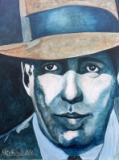The begining - Early Activists
After the Civil War blacks suffered greatly in the South. African Americans became targets for enraged white southerners. Lynchings killed hundreds of blacks every year.

Elijah Muhammad was considered by Black Muslims as the "Last Messenger of Allah." In his 41 years as its spiritual leader, Elijah Muhammad molded the Nation of Islam into a significant religious body. Elijah Muhammad did not create the Nation of Islam but he built it on a number of principles. Among them: Islam is the true religion, "knowledge of self" is vital, "doing for self" is necessary, the black man is supreme and the white man is "the devil."
One of 13 children, Elijah Robert Poole was born in Sandersville, Georgia on October 7, 1897. His parents were sharecroppers and former slaves, his father William Poole, was also a Baptist preacher. Poole's formal education ended at the fourth grade. To support the family, he worked with his parents as a sharecropper. When he was sixteen years old, he left home and began working in factories and at other businesses.
Elijah Poole married Clara Evans on March 7, 1917. Part of the Great Migration, Elijah Poole and his wife moved north to Detroit Michigan In 1923. Wanting to leave the Jim Crow South, Poole later said, "I seen enough of the white man's brutality to last me 26,000 years". Elijah Poole struggled to find and keep enough work to provide for his wife and eight children, especially during the Great Depression.
In 1930, Elijah Poole met Fard Muhammad, also known as W. D. Fard, who had founded the Lost-Found Nation of Islam. Poole soon became Fard's top organizer and follower. Master W. Fard Muhammad gave him the name "Karriem" and made him a minister. Later he was promoted to the position of "Supreme Minister" and his name was changed to Muhammad. "The name 'Poole' was never my name," he would later write, "nor was it my father's name. It was the name the white slave-master of my grandfather after the so-called freedom of my fathers." An absolute believer in the Islam religion Elijah Muhammad was arrested for contributing to the delinquency of a minor because he sent his children to the University of Islam instead of to public schools.
Settling in Chicago, away from hostile Muslim factions in Detroit, Muhammad built what quickly became the most important center of the movement. Chicago soon featured not only a Temple of Islam, but a newspaper called Muhammad Speaks, a University of Islam, which was actually a private elementary and high school, and several movement-owned apartment houses, grocery stores, and restaurants. In 1934, Elijah Poole returned to Detroit, and a few months later W. D. Fard mysteriously disappeared, his whereabouts never known. Some political and theological rivals accused Poole of foul play, though no evidence ever surfaced. Elijah Muhammad decided to return to Chicago and run the Nation of Islam from there.
Elijah Muhammad revised the theology of the movement, proclaiming Fard as the earthly incarnation of Allah, the Muslim name for God, and named himself Allah's divinely appointed prophet. Elijah Muhammad also taught that blacks constituted the original human beings, but that a mad black scientist named Yakub had created a white beast through genetic manipulation and that whites had been given a temporary dispensation to govern the world. It was understood that violent war would be likely before the transition could be completed. In the meantime, Muhammad advocated an independent nation for African Americans.
As the movement grew, Temples were opened in other cities, and farms were purchased so that ritually pure food could be made available to members. The movement was a sharply disciplined one. Members had strict rules to follow regarding eating where various foods, such as pork, were forbidden. Smoking, drinking, drugs, the use of profanity, gambling, listening to music, and dancing were all outlawed. The religion also required conservative, neat clothing and good grooming.
In 1942 Muhammad was one of a group of militant African American leaders arrested on charges of sedition, conspiracy, and violation of the draft laws. He was accused of sympathizing with the Japanese during World War II and of encouraging his members to resist the military draft. He had, indeed, argued that all nonwhites are oppressed by whites, and that it made no sense for African Americans to fight those who were victims of white racism as much as they themselves were. Muhammad was certainly no pacifist, but he argued that the only war in which African Americans should participate would be the coming "Battle of Armageddon," in which blacks would reassert their rightful superiority. For his words and actions Muhammad spent four years, from 1942 to 1946, in federal prison at Milan, Michigan.
Malcolm X began to study the teachings of NOI leader Elijah Muhammad while imprisoned for crimes he committed in Harlem. By the time he was paroled in 1952, Malcolm X was a devoted follower. In the late 1950s Malcolm X emerged as the most important figure after Elijah Muhammad in the Nation of Islam. He went on several speaking tours and helped establish several new mosques. He was eventually assigned to be minister of the mosque in New York's Harlem area.
Malcolm's faith was dealt a crushing blow at the height of the civil rights movement in 1963. He learned that his mentor and leader, Elijah Muhammad, was secretly having relations with as many as six women within the Nation of Islam organization. As if that were not enough, Malcolm found out that some of these relationships had resulted in children. Malcolm had strictly adhered to the teachings of Muhammad, which included remaining celibate until his marriage to Betty Shabazz in 1958. Malcolm refused Muhammad's request to help cover up the affairs and subsequent children. Deeply hurt by the deception of Muhammad, whom he had considered a living prophet, Malcolm also felt guilty about the masses he had led to join the NOI, which he now felt was a fraudulent organization built on too many lies to ignore.
On December 1, 1963, Malcolm X stated that he saw President John F. Kennedy's assassination as a case of "The chickens coming home to roost." Soon afterward Elijah Muhammad suspended him and ordered him not to speak for the movement for 90 days. On March 8, 1964, Malcolm X publicly announced that he was leaving the Nation of Islam and starting two new organizations: the Muslim Mosque, Inc., and the Organization of Afro-American Unity. Despite his break from the NOI, Malcolm X remained a believer in the Islamic religion.
Elijah Muhammad moderated the Nation's criticism of whites without compromising its message of black integrity. When Muhammad died on February 25, 1975, the Nation was an important religious, political, and economic force among America's blacks, especially in this country's major cities.
Don't miss a single page. Find everything you need on our complete sitemap directory.
Listen or read the top speeches from African Americans. Read more
Read about the great African Americans who fought in wars. Read more
African Americans invented many of the things we use today. Read more
Thin jazz, think art, think of great actors and find them here. Read more
Follow the history of Black Americans from slave ships to the presidency. Read more
Olympic winners, MVPS of every sport, and people who broke the color barrier. Read more
These men and women risked and sometimes lost their life to fight for the cause. Read more
Meet the people who worked to change the system from the inside. Read more

Visit my RedBubble page and use Michael Arnold Art to create greeting cards, T-shirts, mugs, and more.

The variety and impressive numbers of mammals, birds and marine wildlife in Alaska draw visitors from all over the world. For some travelers, Alaska is wilderness, at least compared to what they may know from back home. The pristine wilderness of Alaska is, perhaps, the last vestige of thriving populations of North American wildlife. Where else can you see polar bears, bald eagles, blue and humpbacked whales, gray wolves, grizzly bears, orcas, lynx, moose, and hundreds of other rare and endangered species in their original and undisturbed natural habitats?

Enjoy our website filled with original signed acrylic paintings by award winning Artist Michael Arnold. Located in Citrus County Florida, Michael Arnold is a the editor at the Citrus County Chronicle. When he's not busy being an editor, he is an avid artist who enjoys painting in a variety of styles. We hope you take the time to click on each image to see a larger view and to learn what the artist, Michael Arnold has to say about his paintings.

As dog owners and people who care deeply for animals and wildlife, we wanted our Dog Encyclopedia to be a website that could empower pet owners to create the most positive, loving environment for their dogs. Dog Encyclopedia realizes that owning a dog is like adding a new member to your family.

Floridian Nature has everything your are looking for in Florida nature. The wildlife of Florida is rich and varied, yet most of us are familiar with only a dozen or so species: the "well known endangered species such as manatees and panthers; those, like raccoons and squirrels, that have adapted to urban environments; the frightening alligators and black bears; and those like the armadillo who can't seem to cross the road. Yet they are just a few of the many animal species found in Florida.
